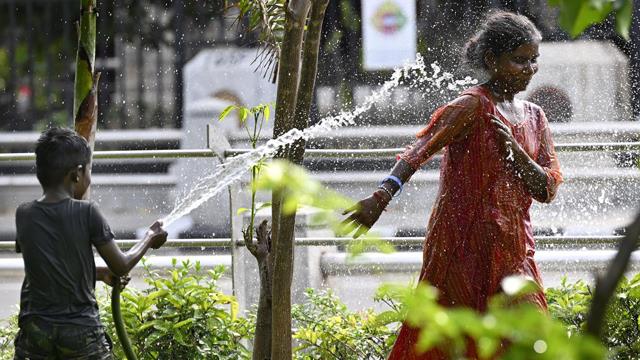
Extreme Heat Exposure On The Rise For Millions Of Kids--UN
"The bodies of young children are not like little adults, they have much more vulnerability to extreme heat," UNICEF advocacy chief Lily Caprani told AFP, also warning of dangers for pregnant women.
Additionally, children lose out from education when schools are forced to close due to high temperatures -- which has affected at least 80 million children in 2024 so far. UNICEF used days reaching 35 degrees Celsius as its benchmark, comparing average temperatures in the 2020-2024 period to the 1960s.
Such hot days -- as well as the means to cope with high temperatures, such as air conditioning -- affect the entire world, it noted.
Children in West and Central Africa are the most exposed, with 123 million children -- 39 per cent of the kids in the region -- facing a third of each year with 95-degree days or higher. At the higher end, in Mali, for example -- where air conditioning is out of reach for millions and blackouts can leave fans idled -- more than 200 days a year can reach 95 degrees or higher.
In Latin America, meanwhile, 48 million children are facing double the number of 95-degree or higher days than 60 years ago.
Worldwide, the "trajectory is getting worse and worse for these children", Caprani said.
Children "are fragile and they breathe very quickly. They can't even sweat like an adult does. They are much more vulnerable to heat stress and it can be literally deadly," she added. High temperatures can contribute to child malnutrition and leave kids more vulnerable to disease, especially malaria and dengue, which spread in warm climates, UNICEF warned. Excessive heat can also negatively impact neurodevelopment and mental health.
UNICEF is calling for increased education for parents to know the signs of heat stroke, better training for medical personnel, and investing in air conditioning in schools -- where, even when classes aren't canceled, learning can be made difficult by hot conditions.
Yet, the bigger push remains in reining in climate change, caused by humanity's use of fossil fuels.
"As governments are currently drafting their national climate action plans, they can do so with the ambition and knowledge that today's children and future generations will have to live in the world they leave behind," UNICEF chief Catherine Russell said in a statement.

Legal Disclaimer:
MENAFN provides the
information “as is” without warranty of any kind. We do not accept
any responsibility or liability for the accuracy, content, images,
videos, licenses, completeness, legality, or reliability of the information
contained in this article. If you have any complaints or copyright
issues related to this article, kindly contact the provider above.


















Comments
No comment